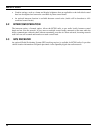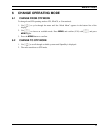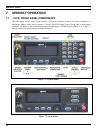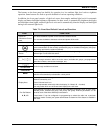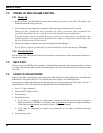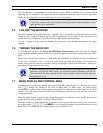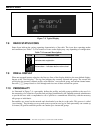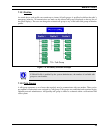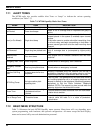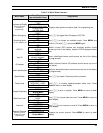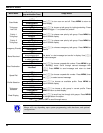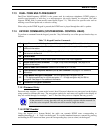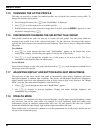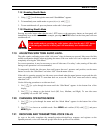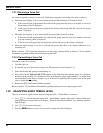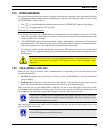
MM-014716-001
24
7.11 ALERT TONES
The M7300 radio also provides audible Alert Tones or “beeps” to indicate the various operating
conditions (see Table 7-3).
Table 7-3: M
7300 OpenSky Mode Alert Tones
NAME TONE DESCRIPTION
Call Queued One low tone/two high tones Call queued for processing.
Call Denied Three short beeps
Radio is out of coverage area or requested talk group is
active.
Grant (or Go-Ahead) Single short beep
Sounded when resources become available for a call
request placed in the queue (if enabled) upon channel
access.
If the radio roams to another site while transmitting, then
it will auto rekey and begin transmitting on that tower. It
gives a second grant tone to let the user know they have
roamed.
Call Removed Single long low-pitched tone
Notifies the user access to the channel has been lost
(out of coverage area or pre-empted by higher-priority
call)
Selective Alert
Received
Four short tones
Only played once to indicate a selective alert has been
received.
Emergency Alert Tone Three long tones Sounds when an emergency alert is declared.
Emergency Cleared
Tone
One long low-pitched tone Sounds when an emergency is cleared.
Selective Call Ring
Tone
A ringing tone similar to a
telephone
Ringing is repeated every four seconds until the call is
accepted or rejected by the radio being called or until the
network drops the call if unanswered after one minute.
PSTN Ring Tones
A single medium-pitch
repeating tone
Two ring tone - one generated by the radio when there is
an incoming telephone call or an outgoing telephone call
attempt is waiting for the telephone interconnect gateway
equipment to dial the Public Switched Telephone
Network (PSTN). The second ring tone sounds when the
gateway equipment has dialed the number.
Roam Tone
Two short tones, one high-
pitched and one low-
pitched
Sounds when the radio transitions from one radio base
station site to another.
Out of Range Tone Three brief tones
If enabled via programming, sounds at a programmable
interval while the radio is in a state of persistent
deactivation.
7.12 BASIC MENU STRUCTURE
Table 7-4 illustrates the basic M7300 OpenSky menu structure. Menu items will vary depending upon
system programming, radio hardware, and optional configurations. All menus except the dwell display
menu can be turned off by network administration personnel.



